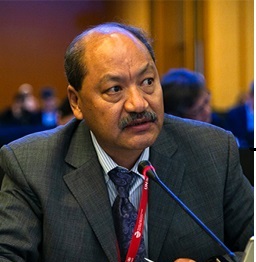
Following a concerted effort by the LDC Group in collaboration with the ecbi, a multi-million project to strengthen the capacities of least developed countries (LDCs) to access finance for climate change adaptation has been approved by the Least Developed Countries Fund (LDCF) on 30 June 2020. The two-year project includes three components:
- a collaborative mechanism for sustained endogenous capacity building on adaptation finance in LDCs;
- technical capacity building for LDC governments; and
- scaling-up of these efforts.
It will establish adaptation-focused policy and technical service providers in four LDCs in four different regions.
The project will be implemented by UNEP and executed by, among others, the International Centre for Climate Change and Development (ICCCAD) in Dhaka, Bangladesh under Dr Saleemul Huq, ICCCAD Director and former Head of the ecbi Workshop Programme.
Background
How can the LDCF, created to help LDCs deal with climate change, best fulfil its function? This was the question that the ecbi team was looking into in early 2015, together with leading members of the LDC Group.
The answer seemed obvious: the biggest challenge that all LDCs face in the context of climate finance is that they lack the capacity to access finance from institutions like the Green Climate Fund (GCF). The funds managed by the LDCF are small in comparison, but they are easier to access, and could play an important role in “levelling the playing field” between countries, by focusing on building the capacity of the LDCs to access funds from these larger institutions.
At the November 2015 Conference of Parties (COP) in Paris, the Global Environment Facility (GEF), which manages the LDCF, was given guidance to carry out a technical review on the potential role of the LDC Fund in enhancing longer-term institutional capacity to design and execute concrete climate change activities (Decision 8/CP.21).
The GEF response was to request further guidance from the COP on what is meant by “longer-term institutional capacity” and “concrete climate change activities” which could only happen the year after.
Following the 2016 ecbi Oxford Fellowship, ecbi supported the LDC Group in drafting a submission to the Standing Committee on Finance (SCF). As a result, the following draft guidance was subsequently forwarded by the SCF to the SBI for consideration: "Requests the Global Environment Facility, […], to add an additional programming priority for the LDCF to strengthen the institutional capacity of the national climate change secretariats or focal points of LDCs, for supporting local stakeholders, inter alia:
(a) In identifying potential funding sources, both national and international;
(b) By providing support and advice on formulating project proposals and documentation;..."
Following tough negotiations, the COP requested the GEF, in its 2016 guidance, “to continue to enhance capacity development in LDCs for the development of project proposals with a focus on identifying potential funding sources, both national and international, and enhancing long term domestic institutional capacities.”
In light of this diluted guidance, the then LDC Chair and members of his advisory team (including the ecbi Director) met with the GEF Secretariat in 2017 to discuss how the additional programming priority originally proposed by the LDC Group could be taken forward at least in spirit. It was decided that this could be done through an LDCF project.
Subsequently, the UNEP office in Bangkok was requested, by the LDC Chair, to put together a proposal for a project to strengthen adaptation project preparation capabilities to improve access to climate finance in LDCs, “To establish a network of LDC-hosted and LDC-owned help-desks to facilitate the development of fundable climate change adaptation projects and to contribute to the emergence of a [climate change adaptation] community of practice in LDCs.” This resulted in development of the five-year project that has now been cleared by the LDCF.
